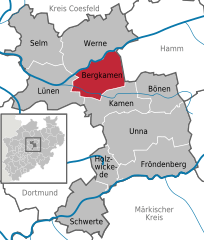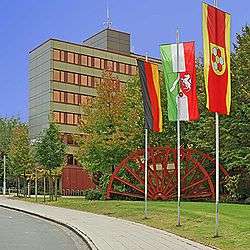Bergkamen
| Bergkamen | ||
|---|---|---|
|
Bergkamen city hall | ||
| ||
 Bergkamen | ||
Location of Bergkamen within Unna district 
 | ||
| Coordinates: 51°37′N 7°38′E / 51.617°N 7.633°ECoordinates: 51°37′N 7°38′E / 51.617°N 7.633°E | ||
| Country | Germany | |
| State | North Rhine-Westphalia | |
| Admin. region | Arnsberg | |
| District | Unna | |
| Government | ||
| • Mayor | Roland Schäfer (SPD) | |
| Area | ||
| • Total | 44.8 km2 (17.3 sq mi) | |
| Population (2014-12-31)[1] | ||
| • Total | 48,218 | |
| • Density | 1,100/km2 (2,800/sq mi) | |
| Time zone | CET/CEST (UTC+1/+2) | |
| Postal codes | 59192 | |
| Dialling codes | 02307, 02389, 02306 | |
| Vehicle registration | UN | |
| Website | www.bergkamen.de | |
Bergkamen is a town in the district of Unna, in North Rhine-Westphalia, Germany. It is situated near the river Lippe, approx. 15 km (9 mi) north-east of Dortmund and 15 km (9 mi) south-west of Hamm.
Bergkamen, a fairly new town in the east part of the Ruhr Area and south of the Münsterland, was founded in 1966 by the merging of at first five smaller communities. The town‘s history, however, reaches back to ancient Roman times - this can be experienced by visiting the Bergkamen Municipal Museum, which has a large Roman department, and the nearby archeological site, the “Roemerlager“.
Main sights
- Westphalian Sports Boat Centre - Marina Ruenthe
- The neighbouring national trust area, “Beversee“, and the wooded hill, “Grosses Holz“, a renaturalized former slag heap, provide an inviting atmosphere for relaxation.
Cultural events
- Harbour Festival ("Hafenfest") in June
- Light Festival ("Lichtermarkt") in October.
Bergkamen is home to theatre performances at the “studio theater bergkamen“ and numerous exhibitions in the town‘s own art gallery “sohle1“ or the “Stadtmuseum“
History

In February 1946, a coal mine in the city suffered a dust explosion that killed 418 miners. This was the worst mining accident in German history.[2]
International relations
Twin towns – Sister cities
 Hettstedt, Germany, since 1990[3]
Hettstedt, Germany, since 1990[3] Taşucu, Turkey, since 1994[3]
Taşucu, Turkey, since 1994[3] Gennevilliers, France, since 1995[3]
Gennevilliers, France, since 1995[3] Wieliczka, Poland, since 1995[3][4]
Wieliczka, Poland, since 1995[3][4]
References
- Notes
- ↑ "Amtliche Bevölkerungszahlen". Landesbetrieb Information und Technik NRW (in German). 23 September 2015.
- ↑ Exorcising Hitler; The Occupation and Denazification of Germany, Frederick Taylor, Bloomsbury Press
- 1 2 3 4 5 "List of Twin Towns in the Ruhr District" (PDF). © 2009 Twins2010.com. Retrieved 2009-10-28. External link in
|publisher=(help) - ↑ "Wieliczka Miasta partnerskie" [Polish]. Urząd Miasta i Gminy Wieliczka. Retrieved 2013-06-25.
External links
| Wikimedia Commons has media related to Bergkamen. |
| Wikivoyage has a travel guide for Bergkamen. |
| ||||||||
|

